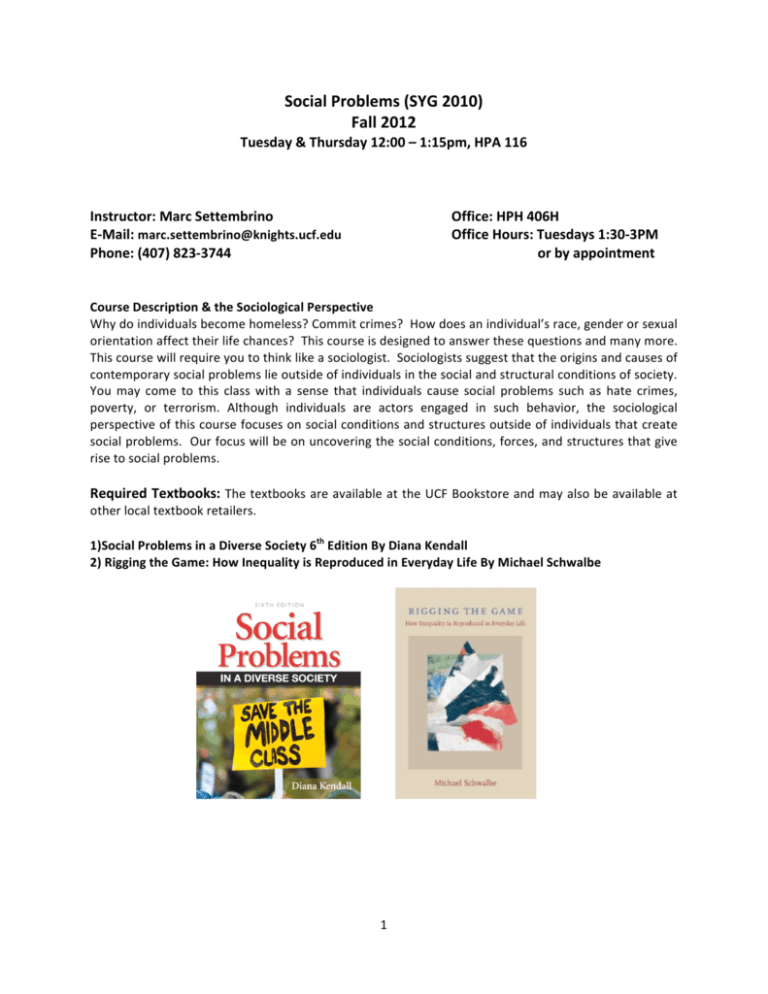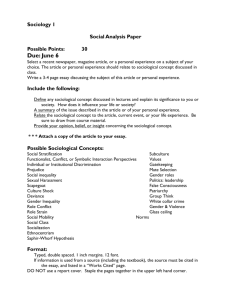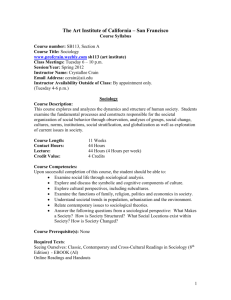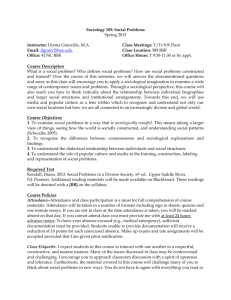Social Problems – Syllabus Fall 2012 (UCF)
advertisement

Social Problems (SYG 2010) Fall 2012 Tuesday & Thursday 12:00 – 1:15pm, HPA 116 Instructor: Marc Settembrino E-­‐Mail: marc.settembrino@knights.ucf.edu Phone: (407) 823-­‐3744 Office: HPH 406H Office Hours: Tuesdays 1:30-­‐3PM or by appointment Course Description & the Sociological Perspective Why do individuals become homeless? Commit crimes? How does an individual’s race, gender or sexual orientation affect their life chances? This course is designed to answer these questions and many more. This course will require you to think like a sociologist. Sociologists suggest that the origins and causes of contemporary social problems lie outside of individuals in the social and structural conditions of society. You may come to this class with a sense that individuals cause social problems such as hate crimes, poverty, or terrorism. Although individuals are actors engaged in such behavior, the sociological perspective of this course focuses on social conditions and structures outside of individuals that create social problems. Our focus will be on uncovering the social conditions, forces, and structures that give rise to social problems. Required Textbooks: The textbooks are available at the UCF Bookstore and may also be available at other local textbook retailers. 1)Social Problems in a Diverse Society 6th Edition By Diana Kendall 2) Rigging the Game: How Inequality is Reproduced in Everyday Life By Michael Schwalbe 1 Course Objectives 1. To develop a "sociological imagination" – the ability to understand the ways in which individual biography is shaped by social location, and how "social problems" differ from "individual troubles." 2. To apply a critical perspective to the ways in which social problems come to defined in larger society, how debates about social problems are framed, and how they affect you. 3. To employ social science inquiry, particularly sociological theory and methods of research, to analyze social problems and dominant trends in society. 4. To contrast the ways in which "social problems" are constructed differently over time and across different societies. 5. To evaluate the ways in which cultural differences between societies and economic/political relationships across national boundaries are responsible for the ways in which social problems are socially constructed. 6. To compare the ways in which social groups differ in experiencing or being defined as a "social problem," especially as these differences pertain to socio-­‐economic standing, race, gender, religion, and sexual orientation. 7. To critique public discussions of social problems, including those that occur within research, media and political arenas, and to evaluate the credibility of sources of information and claims. Student Learning Outcomes 1. Students will demonstrate an understanding of the ways in which individual biography is shaped by social location, and how "social problems" differ from "individual troubles" (sociological imagination) by applying sociological theories and concepts to real world social problems. 2. Students will demonstrate the critical ability to examine how "social problems" receive attention and come to be defined in larger society, and how different groups and institutions "frame" debates on social issues. 3. Students will demonstrate the ability to employ social science data to study social problems and emerging trends. 4. Students will demonstrate the ability to evaluate the ways in which "social problems" are defined differently over time and across societies. 5. Students will demonstrate the ability to evaluate the ways in which cultural, economic and political differences shape how societies view social problems. 6. Students will demonstrate an understanding of the ways in which social groups differ in experiencing or being defined as a "social problem." 7. Students will demonstrate the abilities to critically analyze public discussion of social problems and evaluate credibility of sources of information and claims. 2 Grading Course grades will be made up of the following components: Item Points Tests 4 X 100 points 400 Written Assignment 100 Homework/In Class Writing 100 Total 600 Tests – Four (4) tests will be given during the semester. Tentative test dates can be found in the course schedule. More information will be provided regarding test material as dates approach. There is no final exam and tests are not cumulative. The last test will take place during exam week. Written Assignment – You must complete one of three written assignments. Each assignment is different, and allows you to choose a project that suites your strengths and interests. However, all assignments should take an equal amount of time and effort to complete. Assignments will be due at different points during the semester. The available written assignments are: 1. Social Problems in Fiction 2. Hop on the Bus 3. Research Paper More information on these projects can be found on Webcourses and will be distributed in class. Homework & In-­‐Class Writing – Students will complete 10 short homework or in-­‐class writing assignments. Examples may include: reflection on course readings, finding and summarizing news stories related to class material, short essay responses. Each assignment will be worth 10 points. Final Grades I use a total points grading system. Your final grade will be calculated by dividing the total number of points you have earned, by the total points possible. For example, if you earn 545 points, I will divide 545 by 600 and your final grade will be 90.83. I will round final grades ending in .60 and above to the next highest whole number. Thus, in the above example would result in a final grade of 91.00 for grading purposes. Final grades will be determined using the Grading Scale A A-­‐ B+ B B-­‐ C+ C C-­‐ D+ D D-­‐ F >94 93-­‐90 89-­‐87 86-­‐84 83-­‐80 79-­‐77 76-­‐74 73-­‐70 69-­‐67 66-­‐64 63-­‐60 <60 564 540 522 504 480 462 444 420 402 384 360 359 Extra Credit As the instructor I reserve the right to offer extra credit opportunities throughout the semester; students should not expect extra credit opportunities to be given. Extra credit assignments will mean extra work and extra effort on your part. 3 Academic Honesty & Integrity I exercise a zero-­‐tolerance policy for cheating. Any student(s) caught cheating on any assignment will receive a grade of zero for the given assignment. Cheating will be handled on a case-­‐by-­‐case basis. Multiple incidents of cheating may result in a grade of F in the course. Cheating is broadly defined as copying or sharing answers on any exam, or any other assignment in which permission has not been given to share work. Plagiarism is a serious academic offense. As a student you are expected to read and understand the University policy for plagiarism. You must cite all sources you use. Cases of plagiarism will be handled on a case-­‐by-­‐case basis and consequences may result in a grade of zero (0) on specific assignments, an overall grade of F in the course, or the most severe consequence of a grade of FF. If you are unsure of when or how to properly cite material please consult with me, or a UCF Librarian. Attendance Policy You are expected to be on time and in class every day. Although attendance will not be taken, homework assignments and tests will be based off of both course readings and class sessions. If you do not attend class regularly you will NOT be happy with your final grade. Documentation of Absence There may be occasions in which you need miss class for a valid reason. In these situations documentation must be presented in order for you to make up any missed work. Documentation will be verified, anyone found to present false or fraudulent documentation may be found in violation of university policies. Late Work Late work will not be accepted. Except in the case of a documented excused absences late work will not be accepted. If you know in advance that you will not be in class on a scheduled due date or test date you must make arrangements with me to turn in your assignment in advance or to schedule a day and time for you to make up the test. You will have two (2) weeks to make up a test or assignment due to an excused absence. Tests or assignments which are not made up within two (2) weeks of your return to class will be recorded as a zero (0). In extreme circumstances the two (2) weeks policy may be adjusted to accommodate students on a case by case basis. Statement of Accommodation Any student with a disability is encouraged to meet with me right away to discuss accommodations. Each student must bring a current Memorandum of Accommodations from the Office of Student Disability Services which is prerequisite for receiving accommodations. Accommodated examinations through the office of Student Disability Services require advance notice. Religious Observance Policy If you plan to miss class in order to observe a religious holiday that is not an official University holiday you must provide me with written notice (e-­‐mail or written letter) at least one week before the class you intend to miss. If this holiday falls on an exam day you will be required to take a make-­‐up exam. Any assignments due on this day must be submitted on or before the due date. No late work will be accepted. 4 Academic Etiquette The following policies regard academic etiquette. As university students you are expected to treat your colleagues with courtesy and respect. The nature of this course requires that we discuss issues that may be politically sensitive. While it is ok to disagree with each other however at no time shall anyone attack another person (student, instructor or guest speaker) for any reason. Verbal abuse will not be tolerated. As the instructor and facilitator I reserve the right to end any discussion I feel is damaging or threatening to any person, including myself. As mentioned earlier, YOU ARE EXPECTED TO BE IN CLASS ON TIME. Tardiness is very inconsiderate and distracting to your classmates and me. If you are running late please enter the room quietly and courteously. If you are repeatedly tardy I may ask you to meet with me after class to discuss the issue. It is important to be in class on time on test days as I will not allow any student to begin taking a test after a student has left the room. Laptops may be used in class for note taking purposes only. If I suspect you are using your laptop inappropriately I may ask you to turn it off for the remainder of the class session. PLEASE TURN OFF YOUR CELL PHONE. All cell phones must be on silent or turned completely off. A vibrating cell phone is just as distracting as a ringing cell phone. If you need to have your phone on because you are expecting and emergency phone call please advise me at the beginning of class. The Elastic Clause A calendar of scheduled class sessions is included below which should be used to guide your preparation for class. I expect to follow the calendar as closely as possible. However, it is only a guideline. I reserve the option to revise it as necessary to facilitate what I deem to be the best coverage of course material. I will make every effort to inform you of these changes as they arise. Course Readings The majority of readings from this course will come from your textbook. Supplemental readings may be assigned and will be available on Webcourses. You will need to print and bring additional readings to class with you on the days which they are scheduled. 5 Tentative Course Schedule Unit 1 – Introduction to Social Problems and Rigging the Game Week 1 Introduction: the Sociological Imagination and Social Problems August 21 – Course Introduction, What are Social Problems? Review Syllabus, Introduce Each Other August 23 – Social Problems & the Sociological Imagination Read: Chapter 1 of Kendall & Introduction to Rigging the Game Week 2 Rigging the Game Part 1 August 28 – Read Chapter 1 & 2 of Rigging the Game August 30 – Read: Chapter 3 of Rigging the Game Week 3 Rigging the Game Part 2 September 4 – Read: Chapter 4 & 5 of Rigging the Game September 6 – Read: Chapter 6 & 7 of Rigging the Game Week 4 Poverty & Inequality September 11 – Read: Chapter 2 of Kendall September 13 – Wrap up Week 5 – TEST 1: SEPTEMBER 18 Unit 2 – Inequality: Gender, Sexuality and Race Week 5 Gender Inequality September 18 – Test 1 September 20 – Read: Chapter 4 of Kendall) Week 6 Inequality Based on Sexual Orientation September 25 – Read: Chapter 6 of Kendall September 27 – Continue Discussion of Sex Orientation/Sexuality & Gender Week 7 Racial and Ethnic Inequality October 2 – Read: Chapter 3 of Kendall & Unpacking the Knapsack (Webcourses) October 4 – NO CLASS – UCF HOMECOMING 6 Week 8 Wrap Up & Test 2 October 9 – Continue Racial & Ethnic Inequality & HOP ON THE BUS ASSIGNMENT DUE October 11 – Test 2 Unit 3 – Topics in Social Problems Part 1 Week 10 Problems in the Media October 16 – Read: Chapter 14 Mickey Mouse Monopoly October 18 – Violence in the Media Week 12 Prostitution & the Sex Industry October 23 – Read: Chapter 7 October 25 – Feminist Perspectives on Prostitution & Pornography Week 11 Crime & Delinquency October 30 – Read: Chapter 9 of Kendall November 1 – Juvenile Delinquency read The Saints and The Roughnecks (Webcourses) Week 13 Wrap up & Test 3 November 6 – Wrap up SOCIAL PROBLEMS IN FICTION DUE November 8 – Test 3 Unit 4 – Topics in Social Problems Part 2 Week 14 The Environment and “Natural” Disasters November 13 – Read: Chapter 15 in Kendall November 15 – Sociology of Disasters Week 15 Global Social Problems: War & Terrorism November 20 – Read: Chapter 17 RESEARCH PAPER DUE November 22 – NO CLASS – THANKSGIVING HOLIDAY Week 16 – Can Social Problems be solved? November 27 – Chapter 18 of Kendall & Chapter 8 of Rigging the Game November 29 – Wrap up Week 17 – EXAM WEEK -­‐TEST 4 TBD 7






